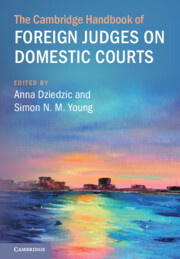Book contents
- The Cambridge Handbook of Foreign Judges on Domestic Courts
- The Cambridge Handbook of Foreign Judges on Domestic Courts
- Copyright page
- Contents
- Contents
- Figures
- Tables
- Contributors
- Acknowledgements
- Table of Cases
- Table of Legislation
- Table of International Instruments
- Abbreviations
- 1 An Introduction to Foreign Judges on Domestic Courts
- Part I Rationales, Motivations and Design
- Part II Implications and Impact
- First-Hand Accounts
- Judicial Identity and the Judicial Role
- 16 Colonial-Era Mixed Courts, the Compensation of Foreigners for Wrongful State Acts and the Emergence of International Judges as Guarantors of Individual Rights
- 17 Forging a Judicial Identity
- 18 Domestic Criticisms of Foreign Judges
- 19 Judicial Mobilities
- Adjudication, Accountability and Independence
- Index
16 - Colonial-Era Mixed Courts, the Compensation of Foreigners for Wrongful State Acts and the Emergence of International Judges as Guarantors of Individual Rights
from Judicial Identity and the Judicial Role
Published online by Cambridge University Press: 26 October 2023
- The Cambridge Handbook of Foreign Judges on Domestic Courts
- The Cambridge Handbook of Foreign Judges on Domestic Courts
- Copyright page
- Contents
- Contents
- Figures
- Tables
- Contributors
- Acknowledgements
- Table of Cases
- Table of Legislation
- Table of International Instruments
- Abbreviations
- 1 An Introduction to Foreign Judges on Domestic Courts
- Part I Rationales, Motivations and Design
- Part II Implications and Impact
- First-Hand Accounts
- Judicial Identity and the Judicial Role
- 16 Colonial-Era Mixed Courts, the Compensation of Foreigners for Wrongful State Acts and the Emergence of International Judges as Guarantors of Individual Rights
- 17 Forging a Judicial Identity
- 18 Domestic Criticisms of Foreign Judges
- 19 Judicial Mobilities
- Adjudication, Accountability and Independence
- Index
Summary
Colonial mixed courts were promoted by Western powers as an alternative to consular jurisdiction in non-Western countries. Unlike ordinary local courts, mixed courts were composed partly or entirely of foreign judges and applied Western or Western-inspired procedural and substantial rules. Unlike consular courts, they were considered an integral part of the legal order of the host polity, which could be a fully sovereign state, a protectorate, a mandate, or a condominium. After identifying the core features of colonial mixed courts and explaining their rationale, this chapter examines judicial activism in adjudicating the compensation mechanisms provided to foreigners by some mixed courts. The chapter shows how, despite the demise of mixed courts in the course of decolonisation, their pioneering experience in the field of transnational dispute resolution and the protection of individual rights contributed to the emergence of international judges as guarantors of individual rights in the twentieth century.
Keywords
- Type
- Chapter
- Information
- The Cambridge Handbook of Foreign Judges on Domestic Courts , pp. 250 - 267Publisher: Cambridge University PressPrint publication year: 2023

